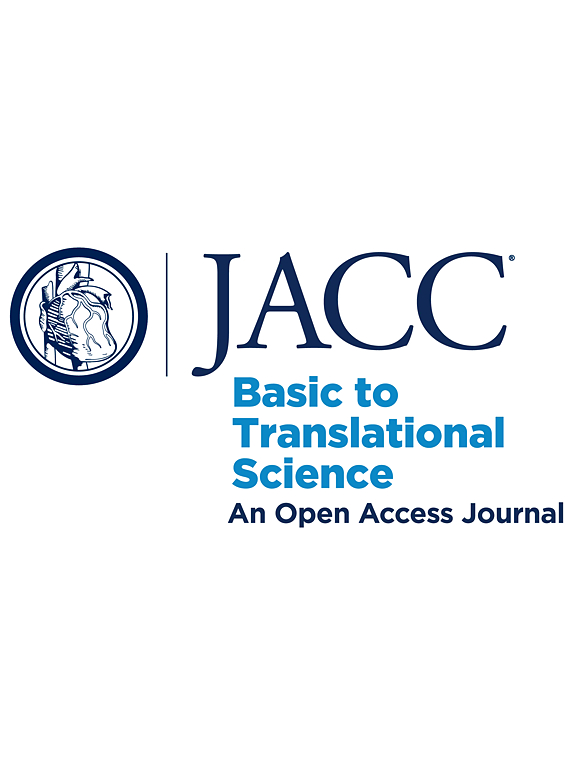Proteomic Profile of the ICAM1 p.K56M HFpEF Risk Variant
IF 8.4
1区 医学
Q1 CARDIAC & CARDIOVASCULAR SYSTEMS
引用次数: 0
Abstract
A common missense variant in ICAM1 among African American individuals (rs5491; pK56M) has been associated with risk of heart failure with preserved ejection fraction (HFpEF), but the pathways that lead to HFpEF among those with this variant are not clear. In this analysis of 92 circulating proteins and their associated networks, we identified 7 circulating inflammatory proteins associated with rs5491 among >600 African American individuals. Using weighted coexpression network analysis, 3 protein networks were identified, one of which was associated with rs5491. This protein network was most highly represented by members of the tumor necrosis receptor superfamily. The rs5491 variant demonstrated an inflammatory proteomic profile in a separate cohort of African American individuals. This analysis identifies inflammatory pathways that may drive HFpEF among African American individuals with the ICAM1 pK56M (rs5491) variant.
ICAM1 p.K56M HFpEF 风险变异体的蛋白质组概况
非裔美国人中一种常见的错义变异(rs5491; pK56M)与射血分数保留型心力衰竭(HFpEF)的风险有关,但导致该变异者发生 HFpEF 的途径尚不清楚。在对 92 种循环蛋白及其相关网络的分析中,我们在超过 600 名非洲裔美国人中发现了 7 种与 rs5491 相关的循环炎症蛋白。通过加权共表达网络分析,我们发现了 3 个蛋白质网络,其中一个与 rs5491 相关。该蛋白质网络中肿瘤坏死受体超家族成员的代表性最高。在一个单独的非裔美国人队列中,rs5491 变体显示出炎症蛋白组特征。这项分析确定了可能驱动具有 pK56M (rs5491) 变体的非裔美国人发生高房血症的炎症途径。
本文章由计算机程序翻译,如有差异,请以英文原文为准。
求助全文
约1分钟内获得全文
求助全文
来源期刊

JACC: Basic to Translational Science
CARDIAC & CARDIOVASCULAR SYSTEMS-
CiteScore
14.20
自引率
1.00%
发文量
161
审稿时长
16 weeks
期刊介绍:
JACC: Basic to Translational Science is an open access journal that is part of the renowned Journal of the American College of Cardiology (JACC). It focuses on advancing the field of Translational Cardiovascular Medicine and aims to accelerate the translation of new scientific discoveries into therapies that improve outcomes for patients with or at risk for Cardiovascular Disease. The journal covers thematic areas such as pre-clinical research, clinical trials, personalized medicine, novel drugs, devices, and biologics, proteomics, genomics, and metabolomics, as well as early phase clinical trial methodology.
 求助内容:
求助内容: 应助结果提醒方式:
应助结果提醒方式:


